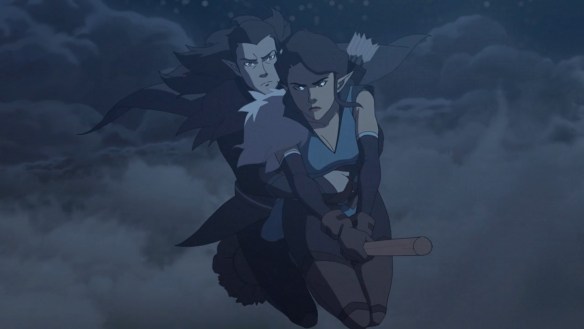Hello folks, and welcome back to Wrong Every Time. Today I am thrilled to announce we are returning to the adapted tabletop adventures of Vox Machina, that unruly band of heroes tasked with saving Tal’Dorei from the draconic Chroma Concave. Their escapades have proven both entertaining stories in their own right, and also persistent vehicles for discussion of tabletop gaming more generally. As someone who came late to tabletop gaming from a background in traditional fiction, I have a voracious appetite for any sort of lessons worth gleaning from the ramblings of Matt Mercer and his players, and have been impatiently awaiting this return to the field.
As for my own DnD adventures, it’s apparently been most of a goddamn year since we last checked in, so yes, I have news to report. The campaign I had at that point been running for around fourteen months came to an end in late winter, with my players battling an avatar of Asmodeus atop the high tower of the ninth circle of hell. It seemed an appropriately bombastic conclusion for my adventure, which followed the classic “the enemy you have been fighting was actually a pawn of the real threat” formula to swerve (with plentiful foreshadowing, mind you) from a pan-Dale civil war to a struggle to prevent hell’s emergence into the mortal realm. Old allies were recalled, grand foes were slain, and our sorcerer used grease to make the princess of hell fall on her ass at least three separate times.
Since then, we’ve begun a new campaign, with one of my campaign’s players DMing us through the on-book Curse of Strahd adventure. This has resulted in a chilling discovery: on-book DnD kinda sucks! It’s basically a sandbox designed for randomized NPC conversations and combat encounters, possessing none of the guided narrative focus and subsequent dramatic payoffs that is DnD as interpreted by groups like Critical Role. Fortunately, my group came prepared for just such a possibility, as this time we’re essentially creating our own wholly player-side character arcs, and doing our best to remain in-character all through our active sessions. I’ve been leading the charge with this, with my experience running a whole pile of NPCs making it easy to slip into the guise of Tilly the Goblin Cleric, who is a little intimidated by the gloomy world of Barovia, but doing her best to keep spirits high and limbs properly attached.
I’ve been further solidifying our player-side development through the creation of Tilly’s Reports, essentially formalized, in-character session notes that help to keep the party on the same general page dramatically. I’d be happy to share those and more news of our ongoing DnD trials later, but for now, it’s past time to get on with the adventures of Vox Machina. Onward!
Episode 1
We open with the twins flying high above the clouds on Vex’s broom, before Vax performs a high altitude drop straight towards a smoldering volcano, the molten remains of what was once their capital city. Narrative break points are useful for something like this, whether you’re actively segmenting your stories into seasons like this adaptation, or simply saying to your players “we pick up several weeks later, in the midst of a daring new operation.” When I was originally writing my campaign, the connective tissue between each individual quest was important, a key tool in establishing a sense of continuous momentum. Now I mostly return to DMing for individual post-campaign adventures, meaning I have the opportunity to begin sessions on hard resets like this, beginning with “the party sit at a table below deck as a raging sea tosses their boat” or whatnot. Narrative break points and the resets they facilitate are useful in fiction and tabletop play alike
Vax overhears a discussion between two of his draconic adversaries, where they mention that “Raishan’s mission is more critical than ever.” For all I said above, I assume this sequence was conveyed as something simple, like a scrying session, rather than a high-stakes infiltration. Having just one character be in active play for so long is a dicey proposition during tabletop play, but letting Vax flex his rogue abilities seems like a natural embellishment for adaptation
Turns out Thordak’s laid a whole bunch of eggs, leading into an impressively animated escape sequence employing some dramatic movement into depth
Cutting back to a day earlier, we return to Raishan’s secret meeting with Vox Machina. Flashbacks are another natural storytelling device that don’t really translate to tabletop gaming, as the implication that some event happened in the past means the players’ choices can’t impact the present, stripping them of agency. Another flourish presumably added for this adaptation, so we could open with the cliffhanger of Vax’s fate
This alliance with Raishan is a smart narrative beat. Vox Machina’s quest was largely Zelda-style formulaic before – collect the sacred stones, defeat the evil monsters. Placing a traitor within the enemy ranks complicates both the mechanical and moral drama here, while also implying a fluidity within this world and agency of its occupants that makes it feel less obviously gamified
Raishan reveals that a runic curse afflicts her, and that Thordak promised to cure it. The lesson here is don’t overcomplicate things that aren’t directly relevant to the party’s investment in the story – Raishan doesn’t need a laboriously exposited sob story, she just needs a compelling reason to genuinely desire alliance with the heroes. Place moral complexity and emotional ambiguity where it’s most relevant to the players’ desires, we’re not writing Chekhov here
Here, Thordak’s escape from imprisonment serves to clarify, not complicate, his character – it was precisely the manner of escape that drove him mad
“I assume you wish me dead, Ashari? Your wish will soon be granted. The pain grows worse every day.” Even this flourish keeps things morally simple – she’s basically promising to give herself a Disney Villain Death once the story is complete, relieving the party of the burden of executing a former ally
This is something I’ve noticed that on-book DnD is truly abysmal about, owing to its loyalty to the inherently preposterous moral alignment system. Genuinely good people seek rehabilitation rather than revenge, but according to DnD, bad actors are bad simply because they are evil to their core, and there is no way anything could change that. It’s a trite view of morality that isn’t just boring dramatically, it’s also self-sabotaging in terms of characterization – you can’t really play a genuinely good person within DnD’s system, as you’ll at best be either a fascist who executes all who deviate from goodness, or a naive fool who believes in the impossible ideal of redemption. Not a productive framework for stories that believe in things like moral complexity or character growth
Thordak’s eggs put an alleged clock on their adventures. Such inventions are largely just guidelines used to amp up the tension, and to dissuade the party from going off on side adventures once a story has reached a certain level of rising tension
Raishan says they still need the Plate of the Dawnmartyr, plate armor that can repel hellfire itself. We’re still pretty close to Zelda quest territory overall, which I imagine was partially due to Mercer not wanting to get too complicated with the party’s first campaign, and thus giving them extremely clear, gamified goals to achieve. If Curse of Strahd is anything to go by, that’s basically all the official DnD materials offer, at least
“I don’t suppose you brought this thing with you, in like a big bag, or I dunno, a tote?” Returning to the player side, I’m appreciating more the natural self-seriousness versus snark dynamic that tends to emerge between NPCs and players. I don’t break the fourth wall or anything with Tilly, but her naturally chipper, aw-shucks personality does make for a fun contrast with Barovia’s grim inhabitants
Keyleth tells Raishan to go fuck herself, ending any immediate hopes of alliance. A good character beat for Keyleth, though I assume this just means Mercer will weave her next entreaty in somewhere down the line, likely at a point where only allying with her will save them from some worse catastrophe. It’s a fine line, respecting character agency while also making sure the campaign actually works
Percy is unsurprisingly the first to consider the merits of alliance with Raishan, while Pike simply thinks it’d be badass to ride into battle on a dragon. A big moral question like this is a good device for letting the different perspectives and passions of the party shine
“Sometimes a stiff moral code must be bent for the greater good.” An extremely Percy line that of course only incenses Keyleth further. Excellent, natural conflict here
Nice use of foreground details and fireflies to create a sense of depth and seclusion in the composition as Vax talks to Keyleth
“It always feels like my opinions don’t count.” Keyleth’s words do a fine job of merging character acting with player growth – she was indeed just “along for the ride” for most of the early material, seemingly lacking the confidence to guide things like the twins or Percy’s players. Having that feed a growing sense of dislocation within the team is a smart way to turn that into in-universe storytelling
That growing confidence is then echoed by her actually kissing Vax, which unfortunately just prompts another terrible vision of everyone but Keyleth dead
We check in with our other couple the next morning, as Percy frets over their shitty options and his own culpability in bringing Raishan to his home. These private chats are a specific Mercer invention, and a good one – letting pairs of party members talk things out and develop their own relationships is an excellent way to add complexity to the group dynamic, and DnD is full of “who’ll take first watch” contrivances that can easily facilitate such moments. Of course, the question then shifts to player confidence – are your party members capable/desirous of sustaining such conversations without either the whole party present or prompts from the DM? It comes down to confidence and purpose of performance; in my own campaigns, this wouldn’t likely have worked for our last one, but would work fine now that we’re all largely playing in-voice anyway
Player romances, on the other hand, require a whole other level of confidence in divorcing yourself from your character for roleplay. I kinda doubt my party will ever get there, so I content my thirst for romance through NPC drama
They return via treeportation to their destroyed villa. Still can’t believe Mercer had the balls to gift them a beloved home and then immediately blow it up, but it’s certainly one way to demonstrate the world going to hell
The leadup back to our cold open allows for what’s essentially a heist narrative payoff, as our heroes explain all the roles they were performing in the background to facilitate Vax’s infiltration. Another form of storytelling which flat-out doesn’t work in DnD, where the action is always in the present tense, but which serves as a fine flourish for adaptation
Their counterattack shows off more of this scene’s expansive CG staging, facilitating more active camerawork
Percy frees Vax from the ice, who tells them that Raishan was right, and they need to run. This is a tricky thing to accomplish in DnD – creating a fight that the party is supposed to fail at, and thus at some point turn tail and flee. An unspoken promise of DnD is that the DM won’t try to actually make the party die, which can easily lead to a sort of assumption of invulnerability, an expectation that any fight they encounter is within their abilities. Breaking that trust for dramatic or mechanical reasons can result in excellent payoffs, but also requires clear signposting and a willing group of players, or potentially something like the introduction of an NPC they must protect rather than continue the fight
Hah, and here it is – Raishan reappears, right at a moment where they can’t afford not to make an alliance. Keyleth’s perspective is thus respected while still allowing the story to move forward
Raishan seals the deal by actually taking the last blast for them, declaring her allegiance in the strongest possible terms
Thus the party journeys to Ank’Harel on the continent of Marquet, seeking the platemail. Another distinctive cityscape defined by clear, iconic landmarks: here, the pink clay walls, bridges, and central tower. As I’ve said before, without the volume of prose available in a fantasy novel, tabletop cities must be defined through clear broad strokes, Civ-style legendary buildings
With no DM at hand, Gilmore provides our exposition regarding the city’s main features
Ooh, love these full party shots as they lurk in an alley by their target. The use of uneven shading pops as much here as it did back in the Feywilds
But before they can approach, Ripley strikes first, grabbing the plate and prompting a rooftop chase. I’ve dabbled in creating scenes like these, but ultimately couldn’t find a way to crack them – the trouble is, you just can’t effectively gamify large spaces with potentially divergent paths like this, meaning chase scenes naturally reduce to a series of skill checks prompted by things like “there’s a gap between the roofs” or “a guard lunges at you” or whatnot, with little of the sense of urgency and momentum that defines a cinematic chase scene. I might actually check the equivalent episode of Vox Machina’s tabletop sessions, just to see how Mercer handled this sequence
Meanwhile, Scanlan’s goofing off with Vex’s borrowed broom. A fine dramatic shorthand for Scanlan’s general, persistent issue of simply not taking this campaign seriously
Aw shit, seems like Ripley’s made a new deal with Percy’s old patron!
And Done
We’re right back into the action, and goddamn does this show give me a lot of things to talk about. It’s delightful to be checking back into with the reluctant heroes of Vox Machina, and the show’s production seems as strong as ever, rich in beautiful background art and dynamic action scenes. We’ve also run into plenty worth discussing regarding player agency and viable forms of tabletop conflict; I’m quite impressed with how Keyleth is coming into her own via her disagreement with this draconic alliance, and will almost certainly be digging into how Mercer conceived his rooftop chase sequence. Every adventure could use a good chase or two, and if Vox Machina possesses the tools to realize one, I’ll gladly take them!
This article was made possible by reader support. Thank you all for all that you do.




